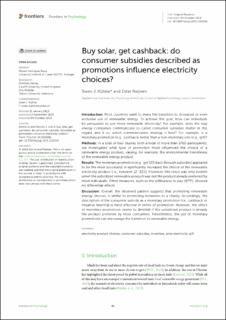Please use this identifier to cite or link to this item:
https://doi.org/10.21256/zhaw-28969Full metadata record
| DC Field | Value | Language |
|---|---|---|
| dc.contributor.author | Kühne, Swen J. | - |
| dc.contributor.author | Reijnen, Ester | - |
| dc.date.accessioned | 2023-10-27T09:08:47Z | - |
| dc.date.available | 2023-10-27T09:08:47Z | - |
| dc.date.issued | 2023 | - |
| dc.identifier.issn | 1664-1078 | de_CH |
| dc.identifier.uri | https://digitalcollection.zhaw.ch/handle/11475/28969 | - |
| dc.description.abstract | Introduction: Most countries want to make the transition to increased or even exclusive use of renewable energy. To achieve this goal, how can individuals be persuaded to use more renewable electricity? For example, does the way energy companies communicate so-called consumer subsidies matter in this regard, and if so, which communication strategy is best? For example, is a monetary promotion (e.g., cashback) better than a non-monetary one (e.g., gift)? Methods: In a total of four studies (with a total of more than 1700 participants), we investigated what type of promotion most influenced the choice of a renewable energy product, varying, for example, the environmental friendliness of the renewable energy product. Results: The monetary promotion (e.g., get $35 back through subsidies) appeared to be the most successful; it significantly increased the choice of the renewable electricity product (i.e., between 12–22%). However, this result was only evident when the subsidized renewable product was not the product already preferred by most individuals. Other measures, such as the willingness to pay (WTP), showed no differential effects. Discussion: Overall, the observed pattern suggests that promoting renewable energy choices, is similar to promoting donations to a charity. Accordingly, the description of the consumer subsidy as a monetary promotion (i.e., cashback or negative labeling) is most effective in terms of promotion. However, the effect of monetary promotions seems to diminish if the subsidized product is already the product preferred by most consumers. Nevertheless, the use of monetary promotions can encourage the transition to renewable energy. | de_CH |
| dc.language.iso | en | de_CH |
| dc.publisher | Frontiers Research Foundation | de_CH |
| dc.relation.ispartof | Frontiers in Psychology | de_CH |
| dc.rights | http://creativecommons.org/licenses/by/4.0/ | de_CH |
| dc.subject | Electricity product choice | de_CH |
| dc.subject | Consumer subsidy | de_CH |
| dc.subject | Incentive | de_CH |
| dc.subject | Solar electricity | de_CH |
| dc.subject | Gift | de_CH |
| dc.subject.ddc | 150: Psychologie | de_CH |
| dc.subject.ddc | 333.79: Energie | de_CH |
| dc.title | Buy solar, get cashback : do consumer subsidies described as promotions influence electricity choices? | de_CH |
| dc.type | Beitrag in wissenschaftlicher Zeitschrift | de_CH |
| dcterms.type | Text | de_CH |
| zhaw.departement | Angewandte Psychologie | de_CH |
| zhaw.organisationalunit | Psychologisches Institut (PI) | de_CH |
| dc.identifier.doi | 10.3389/fpsyg.2023.1155556 | de_CH |
| dc.identifier.doi | 10.21256/zhaw-28969 | - |
| zhaw.funding.eu | No | de_CH |
| zhaw.issue | 1155556 | de_CH |
| zhaw.originated.zhaw | Yes | de_CH |
| zhaw.publication.status | publishedVersion | de_CH |
| zhaw.volume | 14 | de_CH |
| zhaw.publication.review | Peer review (Publikation) | de_CH |
| zhaw.webfeed | Angewandte Kognitionspsychologie | de_CH |
| zhaw.webfeed | PI - Umwelt- und Nachhaltigkeitspsychologie | de_CH |
| zhaw.author.additional | No | de_CH |
| zhaw.display.portrait | Yes | de_CH |
| Appears in collections: | Publikationen Angewandte Psychologie | |
Files in This Item:
| File | Description | Size | Format | |
|---|---|---|---|---|
| 2023_Kuehne-Reijnen_Consumer-subsidies-described-as-promotions-electricity-choices.pdf | 1.83 MB | Adobe PDF |  View/Open |
Show simple item record
Kühne, S. J., & Reijnen, E. (2023). Buy solar, get cashback : do consumer subsidies described as promotions influence electricity choices? Frontiers in Psychology, 14(1155556). https://doi.org/10.3389/fpsyg.2023.1155556
Kühne, S.J. and Reijnen, E. (2023) ‘Buy solar, get cashback : do consumer subsidies described as promotions influence electricity choices?’, Frontiers in Psychology, 14(1155556). Available at: https://doi.org/10.3389/fpsyg.2023.1155556.
S. J. Kühne and E. Reijnen, “Buy solar, get cashback : do consumer subsidies described as promotions influence electricity choices?,” Frontiers in Psychology, vol. 14, no. 1155556, 2023, doi: 10.3389/fpsyg.2023.1155556.
KÜHNE, Swen J. und Ester REIJNEN, 2023. Buy solar, get cashback : do consumer subsidies described as promotions influence electricity choices? Frontiers in Psychology. 2023. Bd. 14, Nr. 1155556. DOI 10.3389/fpsyg.2023.1155556
Kühne, Swen J., and Ester Reijnen. 2023. “Buy Solar, Get Cashback : Do Consumer Subsidies Described as Promotions Influence Electricity Choices?” Frontiers in Psychology 14 (1155556). https://doi.org/10.3389/fpsyg.2023.1155556.
Kühne, Swen J., and Ester Reijnen. “Buy Solar, Get Cashback : Do Consumer Subsidies Described as Promotions Influence Electricity Choices?” Frontiers in Psychology, vol. 14, no. 1155556, 2023, https://doi.org/10.3389/fpsyg.2023.1155556.
Items in DSpace are protected by copyright, with all rights reserved, unless otherwise indicated.